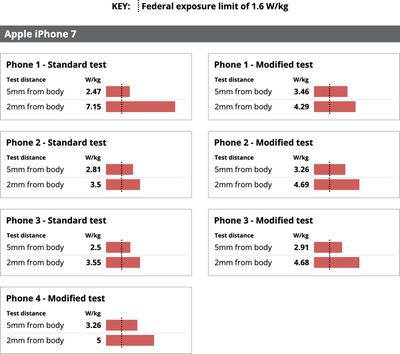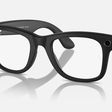Chicago-based law firm Fegan Scott has levied a lawsuit against both Apple and Samsung, claiming that independent testing suggests the radiofrequency radiation levels in recent smartphones "far exceeded the federal limits" when used "as marketed by the manufacturers."
The basis for this lawsuit dates back to August, when The Chicago Tribune launched an investigation into the radiofrequency radiation levels output by popular smartphones.

The paper hired an accredited lab to test several smartphones according to federal guidelines, and found that some of Apple's iPhones are allegedly emitting radiofrequency radiation that exceeds safety limits.
Apple disputed the results and in a statement, said that the testing was inaccurate "due to the test setup not being in accordance with procedures necessary to properly assess the iPhone models."
"All iPhone models, including iPhone 7, are fully certified by the FCC and in every other country where iPhone is sold," the statement said. "After careful review and subsequent validation of all iPhone models tested in the (Tribune) report, we confirmed we are in compliance and meet all applicable ... exposure guidelines and limits."
At the time, the FCC said that it would launch its own investigation into the results, and a day after The Chicago Tribune published its findings, the Fegan Scott law firm pledged to launch its own investigation into the claims.
Fegan Scott enlisted an FCC-accredited laboratory to do its own testing of six smartphone models at distances ranging from zero to 10 millimeters to measure the radiofrequency radiation emitted when touching or in close proximity to the body.
The lab that did the testing claims that at two millimeters, the iPhone 8 and Galaxy S8 were "more than twice the federal exposure limit" and at zero millimeters, the iPhone 8 was "five times more than the federal exposure limit."
After receiving the results, Fegan Scott has decided to launch an official lawsuit against both Apple and Samsung covering the iPhone 7 Plus, the iPhone 8, the iPhone XR, the Galaxy S8, the Galaxy S9, and the Galaxy S10. From attorney Beth Fegan:
"Apple and Samsung smartphones have changed the way we live. Adults, teenagers and children wake up to check their email or play games and do work or school exercises on their smartphones. They carry these devices in their pockets throughout the day and literally fall asleep with them in their beds."
"The manufacturers told consumers this was safe, so we knew it was important to test the RF radiation exposure and see if this was true. It is not true. The independent results confirm that RF radiation levels are well over the federal exposure limit, sometimes exceeding it by 500 percent, when phones are used in the way Apple and Samsung encourage us to. Consumers deserve to know the truth."
According to Fegan Scott, the testing conducted by the lab reflects "actual use conditions" rather than the "conditions set by manufacturers," which means the testing was likely not done in the same way that Apple does its own internal testing. Apple, for example, tests at 5mm, not 0mm and 2mm.
The Chicago Tribune's original testing was done in a manner to simulate the worst possible scenario, with the phone operating in low signal and full power to create the maximum radiofrequency radiation level. It's not clear how the law firm's testing was carried out.
There is no evidence that radiofrequency radiation levels above the federal limits have the potential to cause harm, so consumers should not be alarmed at this time. The FCC is doing its own independent testing and those results should provide more insight into the safety of smartphones.
Apple tells its customers worried about radiofrequency radiation exposure to use a hands-free option, and some past iPhone models have included recommended carrying distances. With the iPhone 4 and 4s, for example, Apple said the smartphones should be held at least 10mm away from the body, and there was a similar suggestion made for the iPhone 7.
The lawsuit is seeking damages from Apple as well as funds to pay for medical monitoring.






















